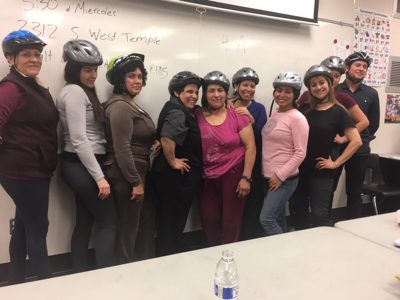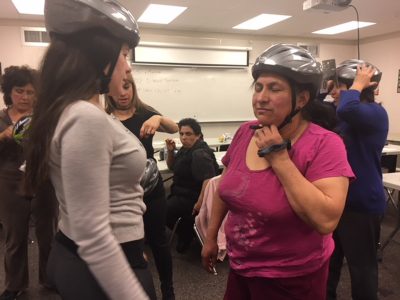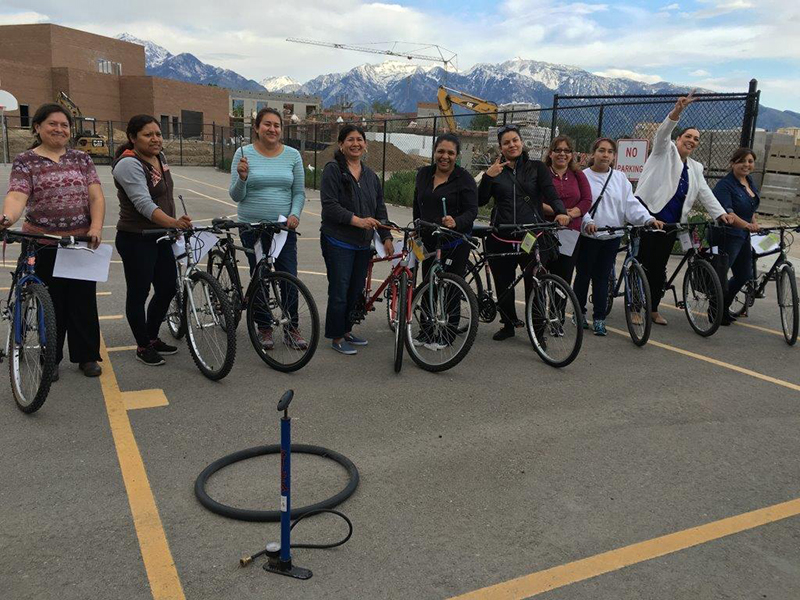The Latina Bike Initiative
Art
Gearing up for spring means dusting off the bike, whether for transportation or leisure. However, affording a bike, much less having the confidence to ride one safely, is something that not everyone has easy access to. The Latina Bike Initiative, a collaboration between the Salt Lake City Bicycle Collective (SLCBC) and Safe Kids Salt Lake County coalition, was piloted in 2016. Now in its second year, it continues to provide classes on these subjects and more for Latino families in Salt Lake County. Safe Kids SL County Coordinator May Romo founded the program and discusses its benefits and how to get involved.
SLUG: The Latina Bike Initiative was something you were inspired to create after hearing a speaker at a bike summit discuss creating biking initiatives for minority communities. What about that speaker made you want to create this type of program? Why in Midvale?
May Romo: I was inspired by the speaker because I had worked with biking programs and school kids. I realized that I needed to broaden this program and bring it to mothers of those same kids who lacked bikes or lacked educational information about bike safety. Then it could be a family biking experience. Midvale [was chosen] because it has a high Latino population and because they have a very active Latino volunteer structure, where it would make it easier for me to get a community volunteer to recruit the women.

SLUG: Why is creating a program like this important for the Latino community?
Romo: I feel it important to empower all diverse populations. Sometimes racial and ethnic populations get left out of some of our initiatives or programs. This was an opportunity for inclusiveness. I felt it was important to empower this group of Latino women by helping them gain access to independent transportation, biking with their children and using it as a form of exercise to stay healthy.
SLUG: What are some challenges concerning bicycling in the Latina community that you hope to overcome or address with these classes?
Romo: The majority of the women do not have bikes, nor can they afford them for themselves. That is why it is important to create partnerships. Our partnership with the SLCBC created a venue for acquiring bikes. Our partnership with Columbia Elementary’s ESL class helped us to recruit and register participants who were already utilizing their ESL services.
SLUG: What materials will attendees need prior to taking the classes? Will classes be bilingual?
Romo: The classes provide all equipment, such as bikes, bike helmets, bike locks. All the women come with varying degrees of riding experiences, but, in the end, all women participate in bike rodeos, bike maintenance and repair. The class sessions are in Spanish and … light snacks are provided for those attending.
SLUG: What can attendees expect to learn through this program?
Romo: Women can expect to learn the history of bikes, different types of bikes, bike repair and maintenance, parts of the bike, bike locks and how to use them properly to avoid theft. Women will learn how to navigate existing bike infrastructure and feel confident when they are riding their bikes in the community and neighborhoods.

SLUG: What will the “neighborhood ride” and “bike rodeo” events entail?
Romo: Women will be assigned their bikes during the second session. The SLCBC will assess height and weight and assign bikes accordingly. Women will practice riding at the local school during bike rodeo, which teaches basic bike-safety principles in a setting similar to a road course that teaches how to handle riding a bike in real life. A neighborhood ride will give the women real-life experience when navigating streets, signs and traffic.
SLUG: What is your goal for attendees to get out of these classes?
Romo: The goal for the women participating in Latina Bike is to build confidence, to try something they may not have felt they could accomplish, to recognize that bike-riding is for everyone. It is important to plant seeds among the moms so that their families support and spread the word to get more Latino families on bikes, especially the young women who may one day be inspired to become world cyclists.
SLUG: How do you see the Latina Bike Initiative making an impact community-wide?
Romo: My hope is that we have sessions in different areas of the county where Latina women express interest in the program. My ultimate hope is that we see more Latino families riding bikes together, that we work together as a community to create cooperative/volunteer bike repair shops so that families can go to these community bike shops and repair their bikes, get a helmet on a loan basis, and make our communities more bike-friendly.
Spring classes for the Latina Bike Initiative run April 12–May 9, with a possible session for fall, which will be announced through the SLCBC and Safe Kids SL County. For more information, visit the Safe Kids SL County coalition at slco.org/health/injury-prevention or call 385.468.5280 or 385.468.3864.
